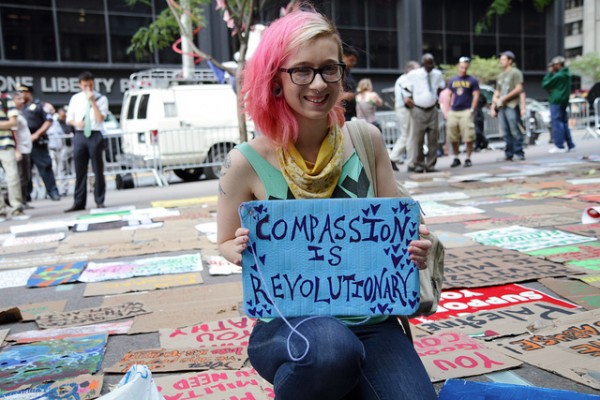Notes
Compassion Bashing
Conservative reactions to the Wall Street protests have been hilarious, even if you don’t think of where they were with the Tea Party. House majority Leader Eric Cantor called the demonstrations “mobs,” as if he were wearing spats. Herman Cain said they shouldn’t blame the banks but only themselves, the losers who had failed–conveniently forgetting that it was the banks that failed, not the workers and students who are paying for the bailout. David Brooks chided the movement for being “small thinkers” who lack big ideas. Frankly, a just, equitable, sustainable democracy is a pretty big idea, but I’ll let that go, because a lack of ideas has nothing whatsoever to do with the current crisis. Instead, perfectly adequate ideas are being blocked at every turn by a Republican party determined to defeat Obama, destroy financial and environmental safeguards, and otherwise continue to serve the lords of capital. Small minds–and small hearts–are a problem, but it helps to get the names right.
And when all else fails, the pundits have insisted that the demonstrators are merely venting emotion, because they lack an agenda for getting out of the economic crisis. That criticism is not only lame, but just wrong. In fact, the New York Times had no trouble figuring out exactly what issues were on the table–and the Times is not exactly one of the hip new media sites. But even so, the choice need not be between protest and policy or emotion and reason. Maybe there is something else at stake.
There are many reasons to question whether the recent protests in the US–and, perhaps sadly, elsewhere–are revolutionary. In fact, it’s easy to mock them on those terms. More seriously (and as I’ve suggested before), there are good reasons to question whether those should be the terms for social and political change in the 21st century. That’s one reason I like this sign: “the new paradigm” may not be a slogan to die for, but you get the idea that we are talking about something beyond policy fixes. I’ll leave it to David Brooks to measure the size of the thinking (although see Novus Ordo Seclorum), but the idea is that if the principle of compassion were really taken seriously, we could have another refounding of American democracy to achieve a better, more decent society. (One also thinks of Gandhi’s comment when asked what he thought of Western Civilization: “I think it would be a good idea.”) But why compassion?
Neo-conservatives have been bashing compassion and (most recently) “empathy” for a couple of decades, so that’s one clue. (Their hostility to the ideal is a telling marker of their radical departure from the conservatism of Edmund Burke, and no less a figure than Adam Smith argued that compassion was the most important “moral sentiment” and essential if a capitalist society was to avoid descending into vicious self-destruction.) I can’t cover all the philosophical and political issues here, but suffice it to say, in a society given over to greed and arrogance, compassion could be a revolutionary idea.
(cross-posted from No Caption Needed)
(photos: Velcrow Ripper and Paul Stein)



Reactions
Comments Powered by Disqus